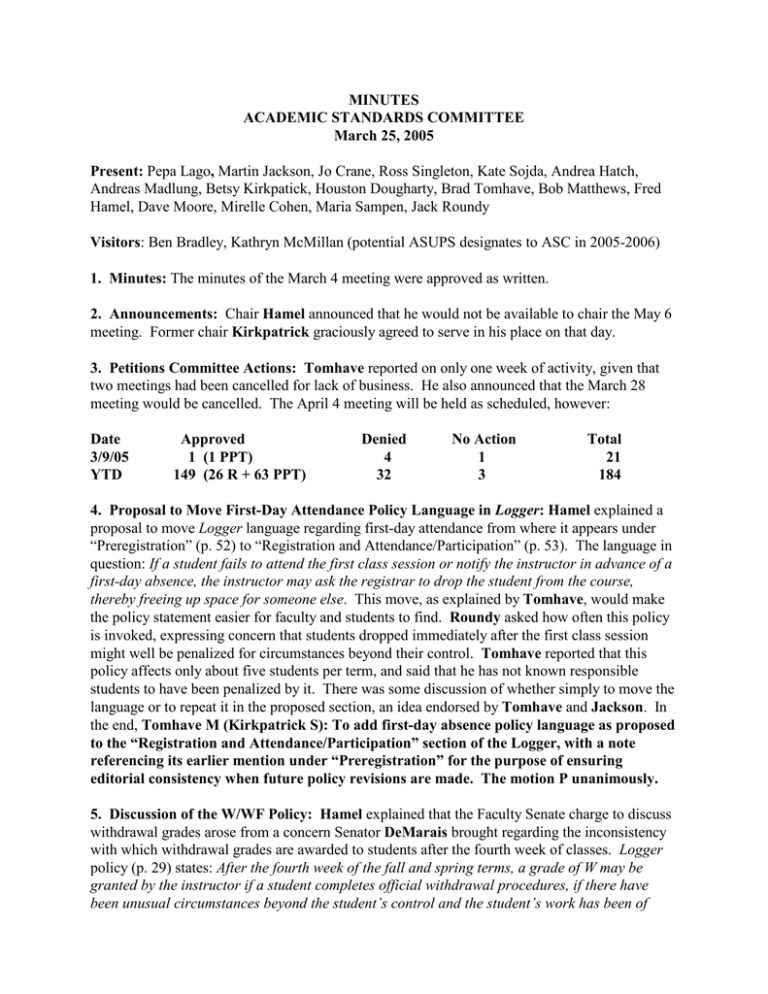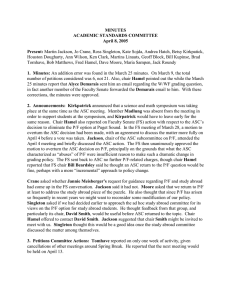MINUTES ACADEMIC STANDARDS COMMITTEE March 25, 2005 Present:
advertisement

MINUTES ACADEMIC STANDARDS COMMITTEE March 25, 2005 Present: Pepa Lago, Martin Jackson, Jo Crane, Ross Singleton, Kate Sojda, Andrea Hatch, Andreas Madlung, Betsy Kirkpatick, Houston Dougharty, Brad Tomhave, Bob Matthews, Fred Hamel, Dave Moore, Mirelle Cohen, Maria Sampen, Jack Roundy Visitors: Ben Bradley, Kathryn McMillan (potential ASUPS designates to ASC in 2005-2006) 1. Minutes: The minutes of the March 4 meeting were approved as written. 2. Announcements: Chair Hamel announced that he would not be available to chair the May 6 meeting. Former chair Kirkpatrick graciously agreed to serve in his place on that day. 3. Petitions Committee Actions: Tomhave reported on only one week of activity, given that two meetings had been cancelled for lack of business. He also announced that the March 28 meeting would be cancelled. The April 4 meeting will be held as scheduled, however: Date 3/9/05 YTD Approved 1 (1 PPT) 149 (26 R + 63 PPT) Denied 4 32 No Action 1 3 Total 21 184 4. Proposal to Move First-Day Attendance Policy Language in Logger: Hamel explained a proposal to move Logger language regarding first-day attendance from where it appears under “Preregistration” (p. 52) to “Registration and Attendance/Participation” (p. 53). The language in question: If a student fails to attend the first class session or notify the instructor in advance of a first-day absence, the instructor may ask the registrar to drop the student from the course, thereby freeing up space for someone else. This move, as explained by Tomhave, would make the policy statement easier for faculty and students to find. Roundy asked how often this policy is invoked, expressing concern that students dropped immediately after the first class session might well be penalized for circumstances beyond their control. Tomhave reported that this policy affects only about five students per term, and said that he has not known responsible students to have been penalized by it. There was some discussion of whether simply to move the language or to repeat it in the proposed section, an idea endorsed by Tomhave and Jackson. In the end, Tomhave M (Kirkpatrick S): To add first-day absence policy language as proposed to the “Registration and Attendance/Participation” section of the Logger, with a note referencing its earlier mention under “Preregistration” for the purpose of ensuring editorial consistency when future policy revisions are made. The motion P unanimously. 5. Discussion of the W/WF Policy: Hamel explained that the Faculty Senate charge to discuss withdrawal grades arose from a concern Senator DeMarais brought regarding the inconsistency with which withdrawal grades are awarded to students after the fourth week of classes. Logger policy (p. 29) states: After the fourth week of the fall and spring terms, a grade of W may be granted by the instructor if a student completes official withdrawal procedures, if there have been unusual circumstances beyond the student’s control and the student’s work has been of passing quality. The concern DeMarais expressed to the Senate and in an email to chair Hamel was that variability in faculty practice awarding grades after the fourth week (some interpreting the rule strictly, others more loosely) created an opening for “grade pressuring.” Roundy followed by circulating portions of a recent email he had received from an unnamed junior faculty member who was feeling this pressure—she had decided to assign a grade of WF in accordance with policy, but was fielding a plea for a W from the student at the apparent encouragement of his advisor, a tenured full professor (also unnamed). Cohen led off the discussion by asking whether we believed our problem was with policy language or inconsistency in faculty practice. Hatch wondered why Roundy believed pressure might be particularly difficult for junior faculty. Roundy, Moore and others responded that student perceptions of faculty “fairness” in grading can color teaching evaluations, which in turn can have repercussions in tenure and promotion decisions. Singleton wondered whether our system of W/WF is common among sister institutions. Tomhave replied that he didn’t know how many follow this system, but knew that several do. Cohen said she thought the problem lay mainly in obliging faculty to assess “unusual circumstances beyond the student’s control.” Matthews pointed out that our policy requires BOTH that a student be passing AND that she be facing “unusual circumstances” to receive a W after the fourth week. Dougharty replied that “passing” also receives widely varying interpretation by faculty who are facing a withdrawing student, often turning on the same “unusual circumstances” that are involved in the decision to withdraw. Moore offered an example: sometimes missing work in a class, if counted as failing, would point to a WF, but if “unusual circumstances” contributed to the missing work, that work might not be counted, and a grade of W assigned. Matthews confessed that he himself sometimes violates a strict reading of the policy, in that he will encourage a struggling student to stay in a class beyond the fourth week to see if he can turn things around, offering a W if things don’t work out on the next big test. Singleton wondered why we have the WF grade at all. Is it necessary? Sojda responded that if, hypothetically, she and another student reached the latter part of the term, and she was doing passing work but needed to withdraw, but her fellow student was not and withdrew as well, she would feel unfairly treated if they both were given the W. Cohen thought that from the standpoint of the transcript, a pattern of W’s was a bad sign (for, say, a graduate school considering an application), whether the withdrawal grade was a W or WF. Hamel replied that Puget Sound’s Education School sees W’s and WF’s very differently in the admission process, though of course we have the advantage of understanding the distinction better than other graduate programs might. Crane spoke of a school at which she taught whose only withdrawal grade was a W; policy at this school did not permit withdrawal after midterm, however. Kirkpatrick said she believed that so long as Puget Sound keeps both W and WF options, there will be no way to “corral” faculty into consistency in awarding these grades. Moore wondered if we could ease the problem by keeping the two grades, but redefining WF not to count in the GPA as an F. Jackson thought that faculty here face a major problem when a student approaches to request withdrawal, hears that he will receive a WF, then develops “unusual circumstances” in response. Sampen suggested that we might move to a policy featuring only the W, but continue to require both a passing grade and unusual circumstances to award it after the fourth week. One concern with restricting withdrawal, Jackson replied, is that sometimes a drop will allow a student to focus on other classes. Sojda added that students who are struggling in one class are often struggling in others, as well, and dropping one may reduce the load sufficiently to make recovery in the others possible. Referring to the e-mail Roundy circulated at the beginning of the meeting, Hamel asked whether the faculty member in question COULD choose to assign a W in such a case, since conditions for assigning that grade were not met. Roundy replied that in practice, he’d guess about half the faculty would assign a W under these circumstances. Crane agreed. Kirkpatrick thought it might well be more than half who would assign the W. Hamel wondered if the Puget Sound administration could monitor the exercise of discretion in this matter. Tomhave replied that except in rare cases calling for a Hearing Board, there is no administrative mechanism for monitoring faculty grading. Dougharty said he thought we should return to this discussion after reviewing the policies of sister institutions. Jackson thought we might keep the policy we have, but begin to require documentation to establish “unusual circumstances.” Singleton said he, like Matthews, often encourages a student who is struggling to stay in his class past the fourth week with the promise of a W if it doesn’t work out. He said he believes that the W itself is penalty enough, carrying with it the loss of credit. He said he favored moving to a W-only policy, moving the deadline for withdrawal to the week after midterm. Jackson wondered if we would need to move to A-F grading at midterm if we instituted such a policy, so students had better information for deciding whether to withdraw. He said he thought the demand for more precise grading at midterm would be a new burden for faculty. Matthews supported Singleton’s W-only idea, urging a deadline a week after midterm grades are reported to give students a chance to discuss possible withdrawal with advisors after seeing their grades. Cohen didn’t think she’d have much trouble assigning A-F grades at midterm, if that change is needed. Singleton then M (Matthews S) to amend our withdrawal grade policy to eliminate the WF and move the deadline for withdrawal to a date two weeks following the midterm grading deadline. Jackson said he supported the motion, but repeated his belief that the change will mean additional work for faculty. Hatch wondered what sort of escape options would exist for students with true emergencies following an earlier withdrawal deadline. Moore repeated the suggestion that we look at the policies of sister institutions before we make such a significant change, particularly since there are two major components to this policy revision. He returned to the suggestion that we keep both W and WF, but remove the latter from the GPA calculation. Hamel suggested that we might keep the policy we have, but seek greater consistency through clearer communication with the faculty about how the policy should be interpreted. Because the five o’clock hour was upon us, Hamel asked us to resume the conversation at our next meeting without a vote on the Singleton motion. With that, we adjourned at 5:00. Respectfully submitted by the ASC amanuensis, Jack Roundy

